
Greta Thunberg doesn’t want you to talk about her anymore
Greta Thunberg’s childhood ended during the pandemic.
Just a few months before the arrival of the coronavirus, the Swedish teenager and her fellow activists had organized a march of millions — possibly the largest climate protest in history. But lockdowns put an end to the boisterous Fridays For Future school strikes, which Thunberg had pioneered and spread around the world. With entire countries in isolation, Thunberg’s movement was “paralyzed,” recalled Dominika Lasota, one of the group’s most prominent figures in Poland.
The pandemic wasn’t just a body blow for an organization completely reliant on momentum from the streets. For many of the activists involved, it also deprived them of a place to give voice to a shared dread: what kids in these times call “climate anxiety.”
It was in search of community, as much as anything, that Thunberg and her friends started hosting “digital strikes” on Zoom. The gatherings were sometimes loosely organized and sometimes barely at all. Oddly, for a bunch of kids considering the apocalypse, the vibe was all about having fun.
“They weren’t even work calls, we would just play music and hang out with each other,” said Mitzi Jonelle Tan, the convener of Youth Advocates for Climate Action Philippines and a Fridays For Future organizer. In contrast to Thunberg’s popular public image, which is largely based on the angriest segments of her speeches, those who know her describe her as warm, caring, funny, extremely blunt and, at times, silly.
Alongside the goofing, the Zoom calls also changed something fundamental about Thunberg’s movement. Built around local marches, started in Europe, the group had been dominated by white, Northern Europeans concerned less about the present than the future. Suddenly, they were face-to-face with activists from around the world for whom climate change was real, pressing and immediate.
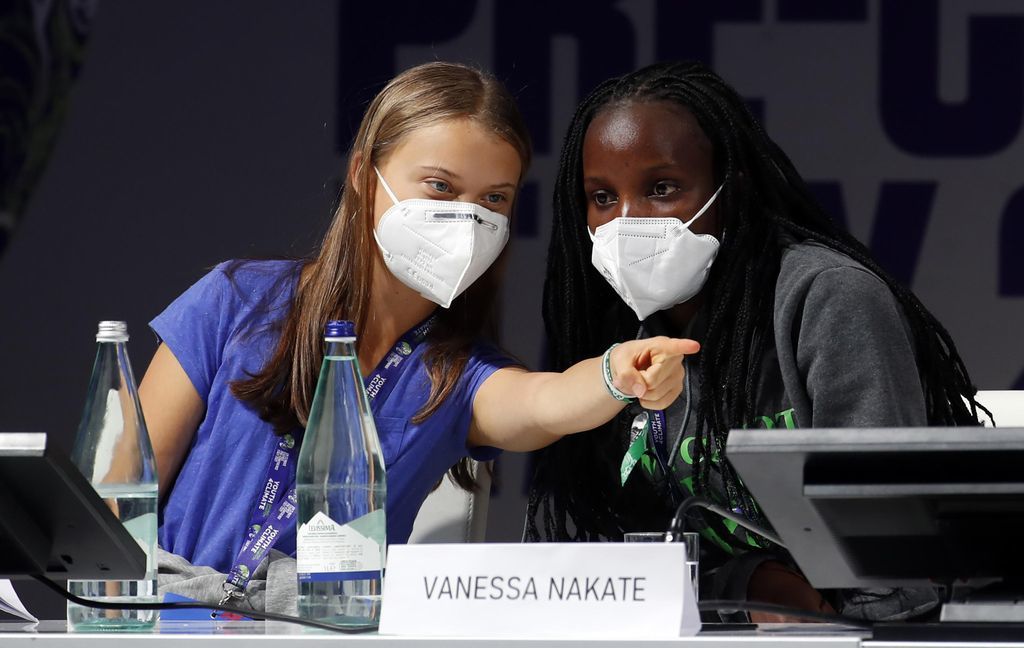 Activists Greta Thunberg, from Sweden, and Vanessa Nakate, from Uganda, at the Youth4climate conference in Milan in 2021
Activists Greta Thunberg, from Sweden, and Vanessa Nakate, from Uganda, at the Youth4climate conference in Milan in 2021
Struggling against a whole different set of challenges in places like Uganda, the Philippines or India, they had different ideas about what it meant to fight climate change; and they were ready to call out the ignorance of their rich, white friends.
Disha Ravi, an activist from India, said she and others from poorer parts of the world were disturbed by their new friends’ lack of understanding of the day-to-day realities of living with climate change. In her view, the environment movement in general was “pretty whitewashed” and Fridays For Future was no exception.
When back-to-back typhoons threatened Tan’s hometown in the Philippines in late-2020, Western members sent through a list of emergency measures she could take. Fill the bathtub with water, they said, in case she was trapped in her home without drinking water. “And I’m like, I don’t have a tub. That’s for like, really rich people. And our tap water isn’t drinkable,” Tan said. “They were so shocked by that.”
Even the name Fridays For Future — which Thunberg had started as a hashtag when her school strikes were still minor gatherings outside the Swedish parliament — was a crock. For much of the world’s population, climate change isn’t a future concern, said Tan. “We’re not just fighting for our future, we’re fighting for our present.”
On separate calls, activists from the global south and indigenous communities formed a group called MAPA — Most Affected People and Areas — and decided Fridays For Future needed to be reshaped if they were to be part of it. They organized “decolonization trainings” for their fellow activists, which Thunberg joined. “We were holding each other accountable because we cared about each other as a movement,” said Tan.
Thunberg was a sponge. She started engaging more and more in the discussion groups. “The pandemic brought all of us really close,” said Ravi. One thing that grabbed Thunberg’s attention was the difficulties other climate activists had in simply protesting. “I understand,” Thunberg said to Tan, during a discussion about an authoritarian law in the Philippines. “To fight for climate justice, you need to have democracy.”

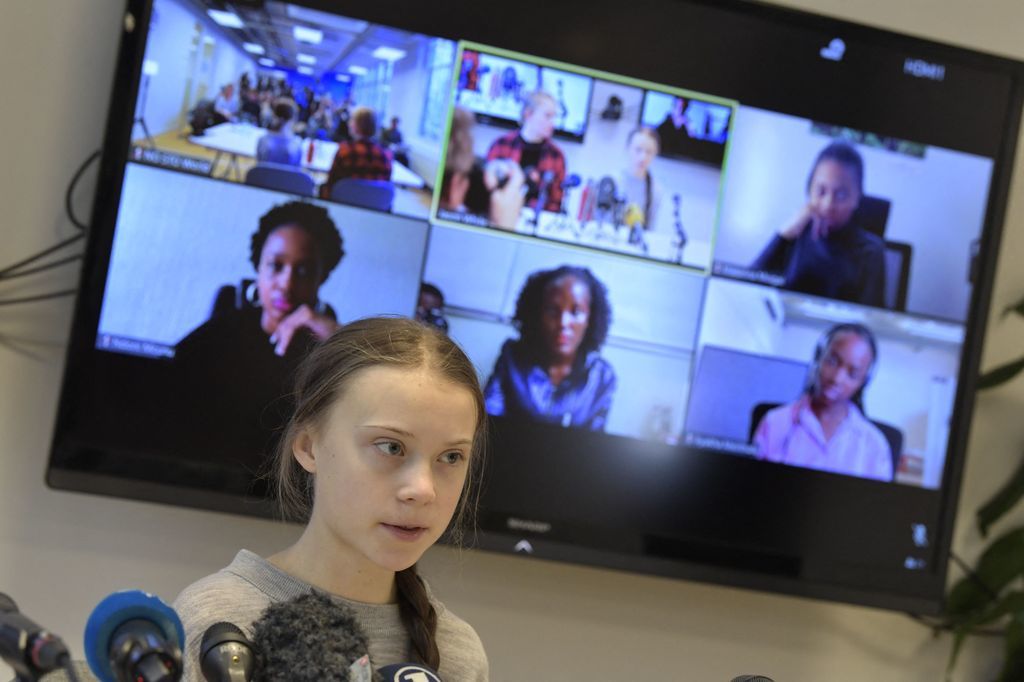
The planet might have been closing down, but Thunberg’s world was opening up. According to interviews with 10 of her closest collaborators and fellow activists, what she heard during those quiet, introspective months changed her — and accelerated an evolution in the focus of her efforts.
As the scramble for vaccines cast global disparities into sharp focus, she threw herself into the fight for vaccine equality — at one point threatening to boycott the COP26 climate talks in Glasgow unless countries could attend on an equal basis. Eventually, the U.K. government responded to the demands of developing countries by rolling out a vaccine program for delegates and Thunberg attended the conference.
Speaking to a crowd outside the meeting in November 2021, Thunberg said climate change was being fueled by a system based on “the idea that some people are worth more than others.” It’s “naive,” she added, to think the problem could be fixed using the same old methods and not addressing the “root cause.” COP26 was a “failure,” she said, and returned to school in Sweden before it was even halfway through.
Having gone stratospheric at the age of 15 with a simple appeal to “listen to the science,” Thunberg, now 19, is being driven by a different message: Listen to the most vulnerable — and help them build the fair future they demand.
The seeds for Thunberg’s conversion to social justice advocacy arguably go back to the very beginning of her activism, which was sparked, famously, by a feeling that she and the rest of her generation were being betrayed: Given the cause and consequences of climate change, why weren’t responsible adults — parents, teachers, politicians — doing more? Why was no one panicking?
In her early teens, Thunberg became sick. She ceased eating and talking. Activism, both Thunberg and her parents have said, was her salvation. It was also a process of finding and banding together people who shared her anxiety and her view that, ultimately, climate change is a moral question: right and wrong — or as she has said, black and white.
And so it was only natural that she was open to the idea that others were being betrayed as well.
One early turning point in her thinking seems to have taken place during a highly publicized trip to the United States in 2019. Thunberg had been invited by U.N. Secretary-General António Guterres to speak at a summit in New York, and rather than take a plane, she and her father had crossed the Atlantic in a borrowed racing yacht.
Jamie Henn — a self-described “aging youth activist” who helped organize her schedule — remembers being struck by how much Thunberg’s approach contrasted with the hyper racially aware politics of the U.S. youth environmental movement.
“When she first came and showed up in New York off the boat, she was really interested in just conveying the scientific urgency of what was happening,” said Henn, who helped start the 350.org campaign group. He had suggested that she meet up with Congresswoman Alexandria Ocasio-Cortez in the South Bronx, where communities of color are exposed to pollution. “It’s not that she wasn’t interested. But I think it just wasn’t really the priority,” he said.
He had the sense that Thunberg wanted to “leave the political stuff … to others” because it was “messier than the clarity of the scientific message.” Then — in a way that foreshadowed her experience during the pandemic — Thunberg started to meet other young people, absorb their experiences and adapt her worldview.
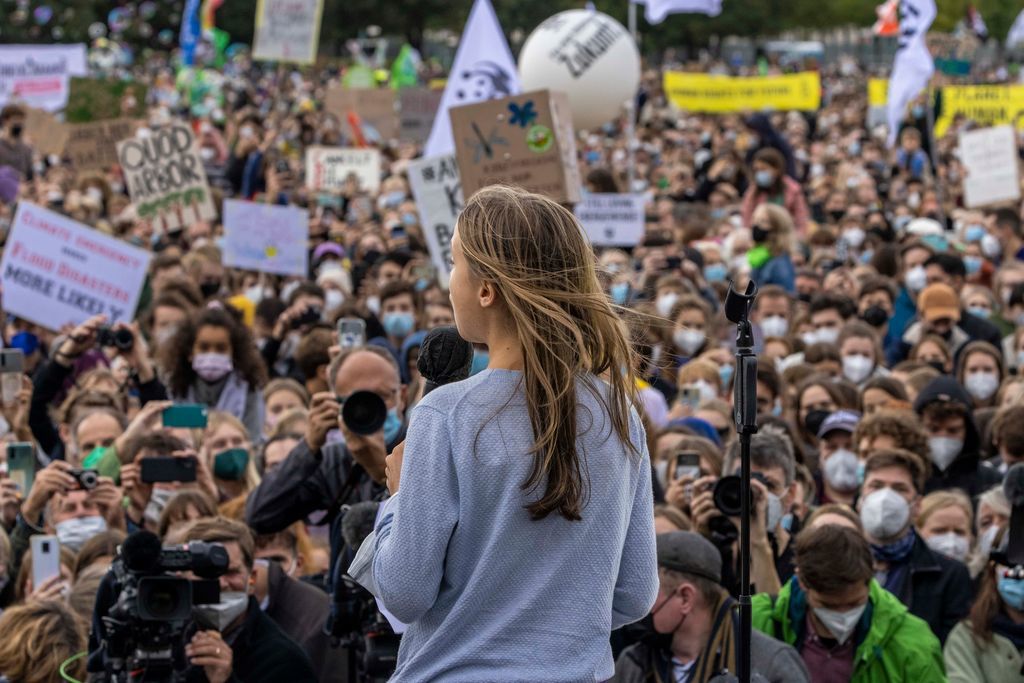 Thunberg speaks at a Fridays for Future protest in Berlin in September 2021
Thunberg speaks at a Fridays for Future protest in Berlin in September 2021
At a meeting with House Speaker Nancy Pelosi in the Congress, Thunberg found herself sitting next to Tokata Iron Eyes, a Sioux youth leader whose Standing Rock tribe were fighting against the construction of the Keystone XL oil pipeline. When Iron Eyes stood to speak, she pointed at a painting of Abraham Lincoln — a white man who had been responsible for the oppression of her ancestors. Why, she asked, should she trust Pelosi to deliver justice for her people? Iron Eyes sat down crying.
“Greta put her arm around her and sat with her,” said Henn, who was at the meeting. Then when it came time for the group to take a picture with Pelosi — “which is clearly what [Pelosi] was looking for” — Thunberg refused, preferring to stay and comfort Iron Eyes.
She “wasn’t really interested in being in this photo with the Speaker of the House, which made, of course, her staff incredibly angry at me,” Henn said. Pelosi’s Deputy Chief-of-Staff Drew Hammill said the intention had been to hear from the activists: “The focus was never a photo op and press was not invited.”
In the following weeks, Thunberg road-tripped across the U.S. in an electric car loaned to her by Arnold Schwarzenegger. She and her father went to a cemetery in Lindstrom, Minnesota, a leafy, lakeside town that calls itself “America’s Little Sweden” — founded in 1894 and named after a Swedish settler called Daniel Lindström. There the neat, well-kept graves marked the prosperous lives of people who could have been the Thunbergs’ ancestors.
The pair then drove to South Dakota and joined Iron Eyes at the Pine Ridge Reservation to visit the single stone memorial at Wounded Knee, where 300 Lakota people were massacred by the U.S. Army in 1890.
Thunberg was struck by the contrast — by the disparity between two communities living at exactly the same time that was still playing out more than a century later. In a book coming out in the fall, according to someone familiar with the text, Thunberg says this 24-hour period gave her a new perspective on the world; one that she struggled to accept.
None of the countless activists, political figures, scientists or writers who came before Thunberg had broken through in the way she did.
Her fame had brought her all the trappings of the international superstar activist: top-billing at the United Nations, annual Nobel Peace Prize chatter, creepy death threats, Twitter spats with Donald Trump and the opportunity to be pals with David Attenborough.
But, in her own bleak assessment, it all made little difference. “They invite cherry-picked young people to meetings like this to pretend they are listening to us,” she told a youth conference in Milan, Italy ahead of COP26 last year.
Her appearances in the halls of power had been sensational, televisual, but ultimately just the right amount of discomfort for world leaders to endure. Politicians would leave the room believing, “Yeah! We got flagellated by Greta, and I’ve been absolved of my sins!” Henn said.
The language she used to burn world leaders got coopted, sublimated. At the address in Milan, Thunberg parodied their empty climate rhetoric: “There is no planet B, the is no planet blah, blah blah.” One month later U.K. Prime Minister Boris Johnson told COP26 that without action their words would be “nothing but blah, blah, blah, to coin a phrase.”
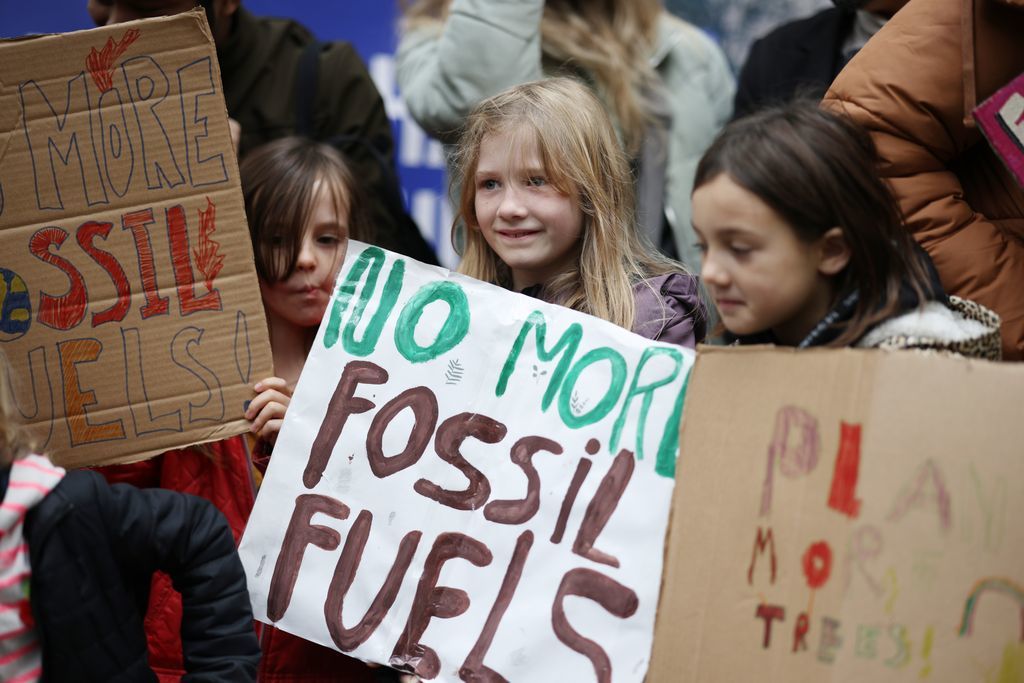
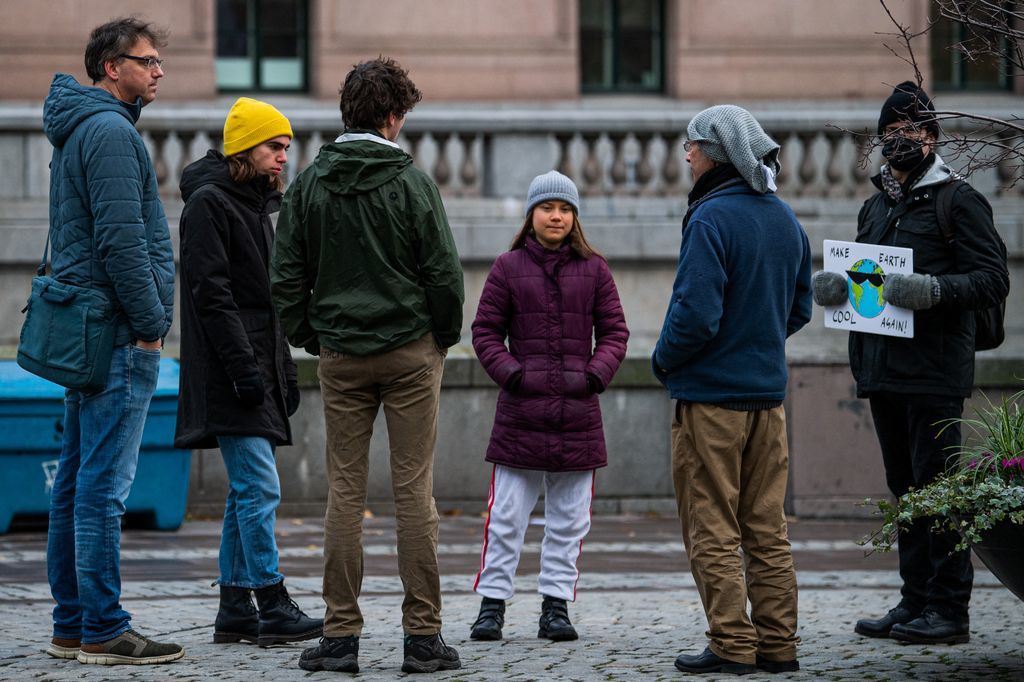
“People have gotten really good at talking about the climate,” said Henn. “And so Joe Biden gets up there and says, ‘This is code red for the planet and I’m going to address it.’ And then they pass the buck on, can’t get climate legislation done … There’s a ton of greenwashing going on right now.”
To be sure, things have shifted in the era of Greta. Climate change is now a first-order geopolitical issue — in the world of finance, it has been “mainstreamed” and there seems little doubt that leaders like Johnson see themselves as committed climate champions and fellow travelers, even if Thunberg doesn’t share that view.
But it’s clear from her public statements that Thunberg has given up on the politics-as-usual cycle of minor, fragile wins. One person familiar with her thinking said these incremental gains are considered worse than nothing at all.
Greta’s new messages of climate justice — making sure the burdens of climate change and the battle against it are shared fairly — is a harder sell in the halls of power than urging policymakers to “follow the science.” In U.N. climate negotiations, for example, demands by poor countries for compensation for the damage being caused by climate change have been successfully stalled by Europe and the United States for years.
As an idea it’s also harder to communicate. As Fridays For Future has evolved, it has started to adopt the language of the global social justice movement, albeit with some internal reservations. During a disagreement over whether to use the phrase “colonizers of the north” when they returned to the streets in October 2021, Thunberg was the decisive voice, said Tan. She stepped in and calmly said, “You should use it.”
But the consensus among campaigners is that no one — not Thunberg, nor the MAPA activists who are growing in prominence — has yet distilled it in the searing manner of Thunberg’s early stuff.
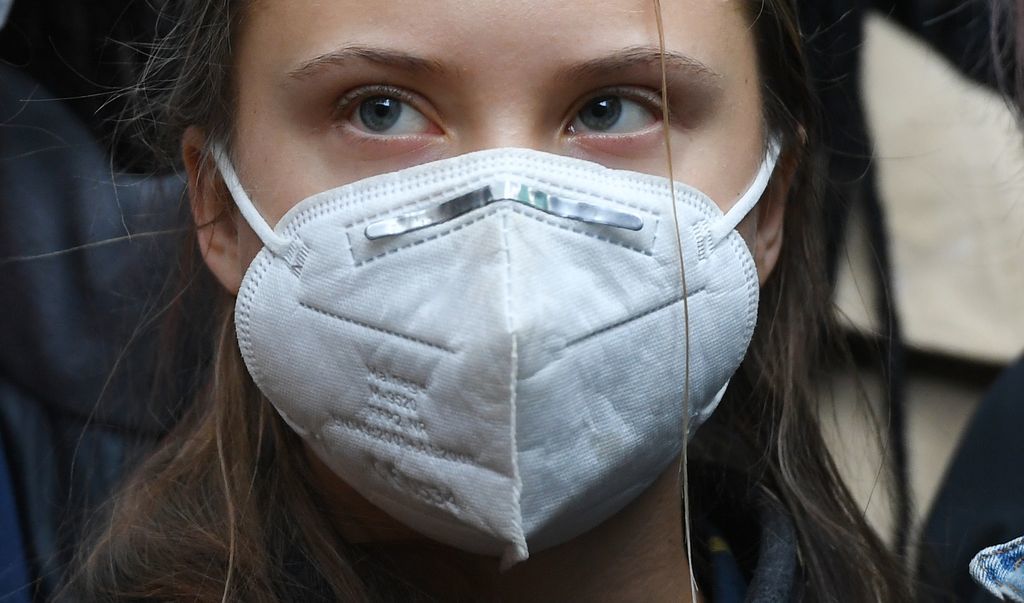 Thunberg attends a demonstration in London | Facundo Arrizabalaga
Thunberg attends a demonstration in London | Facundo Arrizabalaga
Meanwhile, the movement has dwindled. Many young people who had responded to Thunberg’s childlike demand for a fair future, drifted away when the movement started examining what fairness would really require. “We are fully aware that we’re not millions on the streets” anymore, said Lasota, the Polish activist.
Those that remain say it was a necessary evolution. “Who are we now to just always refer to the science; like, ‘Listen to them and ignore us?’” said German Fridays For Future activist Luisa Neubauer. “That of course is difficult now. As some of us at least grow older … we are expected to provide some of the solutions as well.”
Those solutions include a demand for “climate reparations.” That involves handing back land to indigenous communities and transferring wealth and political power from the richest countries that caused climate change to those that will bear the brunt.
For Thunberg, it also means straying into unfamiliar — and sometimes scary territory — as in February last year, when Ravi got involved in a protest led by Indian farmers against agricultural reforms. When Thunberg tweeted out a document containing tips for online campaigning to support the farmers, the Indian government decided that her involvement was evidence that Ravi was involved in an international anti-state conspiracy. Ravi was arrested on charges of sedition, then released nine days later on bail.
Ravi can’t talk about the case, which is still ongoing. But she said of Thunberg that the experience of mixing with activists facing repression “really helped her understand how different it is to be a climate activist in different countries. And I think that’s really why her perspective has changed.”
Thunberg did not want to be interviewed for this article — which is really the point, as POLITICO was reminded bluntly by several Fridays For Future activists. She doesn’t want to be the face of this global climate justice movement.
That does not mean she’s stepping away from activism, her friends said. Although she has been talking about going to university after she completes her final year of secondary education — she skipped a year to go to the U.S — nothing seems to be decided and activism still takes up vast amounts of her non-school time.
For her friends, the media’s continued fascination with Thunberg is both a powerful tool and a source of frustration. There have been several instances, said Ravi, where “media played a role in who got highlighted and who was deliberately silenced.” Several activists pointed to a moment before the pandemic, in 2019 at the COP25 climate summit in Madrid, where Thunberg tried and failed to “pass the mic.”
At a news conference organized by Fridays For Future, she made a brief, stuttering opening statement then directed the media to listen to six activists gathered from around the world from the front lines of climate change. The media response could be summed up by a cameraperson’s decision to keep the camera trained on Thunberg for a full minute, while Marshall Islander Carlon Jajok Zackhras spoke out of frame about 16-foot waves that had forced people from their homes just days before.
Thunberg feels “rightfully annoyed,” said Ravi, but it’s nothing compared to the annoyance of the activists alongside her.
Just a few weeks after COP25 at the World Economic Forum in Davos, an Associated Press photographer edited Ugandan activist Vanessa Nakate, who is black, out of a photo that included four white women — including Thunberg and Neubauer. In Nakate’s response, a furious and sad video shared on social media, she said it was the first time she understood “the definition of the word racism.”
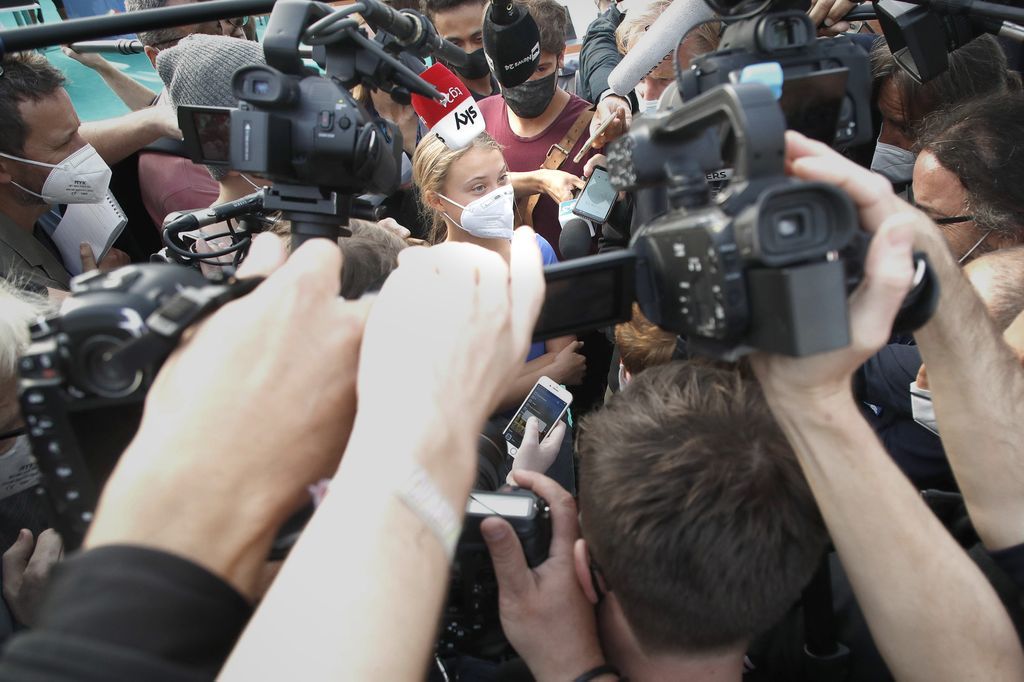
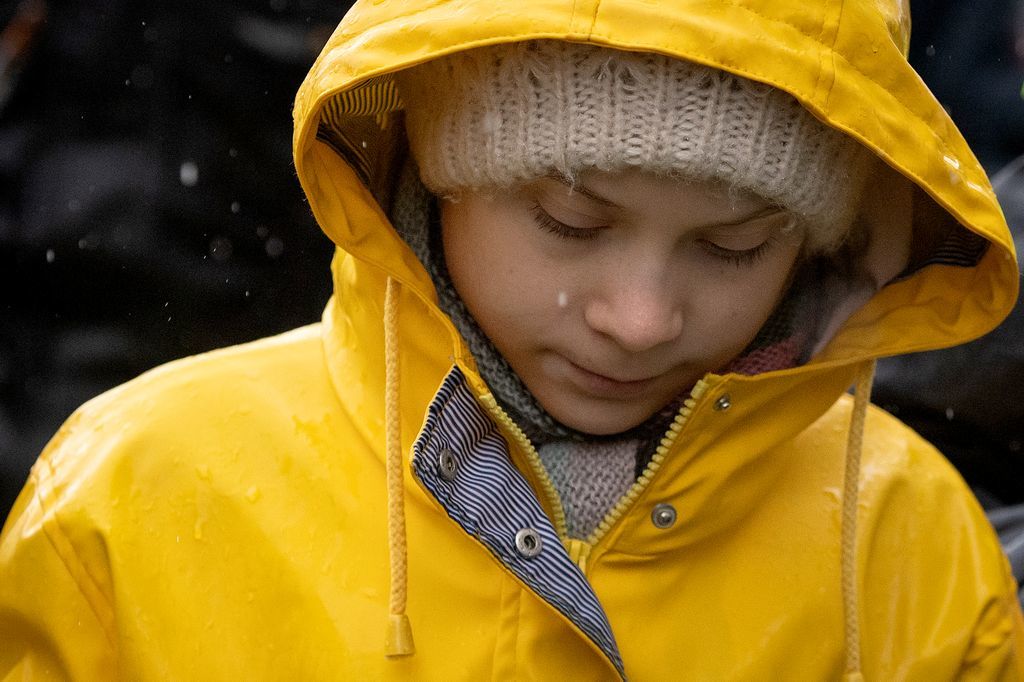
While these setbacks have been painful, Nakate, Tan, Ravi and other MAPA activists have launched their own careers and are gaining increasing prominence. According to media analysis shared with POLITICO by the Global Strategic Communication Council, which offers media support to Thunberg and other Fridays For Future activists, Nakate had a bigger media presence at COP26 than Leonardo DiCaprio or U.N. climate chief Patricia Espinosa.
“There’s been a shift from when we began,” said Nakate. “But that’s not where we hope to be … Those who are experiencing it now, we are the ones who deserve to be listened to.”
Thunberg’s push for climate justice also coincides with a wider reckoning happening across the green movement.
Environmentalism has a history of sidelining the voices of those most vulnerable to climate change on the basis that their demands were not central to the effort, said Tasneem Essop, a South African activist and the executive director of Climate Action Network-International (CAN-I). “In fact, many times they were chastised for raising wider intersectional issues. ‘We must really just fight the climate fight’” she said. “I’ve been in conversations like that.”
More recently, however, events like COVID and the murder of George Floyd in the U.S. have raised awareness of inequality and forced a debate about what — or more pointedly, who — the environmental movement should stand for.
This has created a deep and painful rift in the green movement — between and within groups — according to senior green campaigners. “There’s folks who feel like all of this is a distraction,” said Henn. But he said it was impossible to build broad public support for environmental ambition “without wrestling with issues of social justice.”
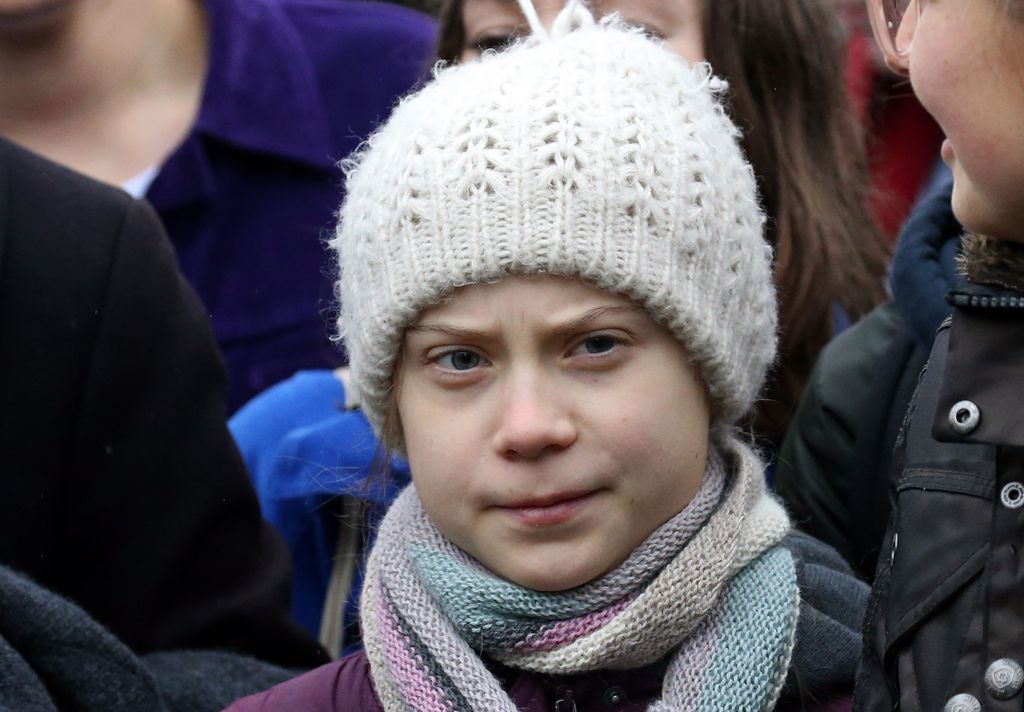 Thunberg leaves the Europa building in Brussels
Thunberg leaves the Europa building in Brussels
It’s deeper into this uncomfortable conversation that Thunberg and Fridays For Future are dragging the climate movement, said Essop: “It is the youth that always ended up leading … movements into a more radical space.”
As Thunberg has noted, not everyone pays the same price for inaction. The U.N. Intergovernmental Panel on Climate Change (IPCC) recently found that around half of humankind lives in circumstances that makes them extremely vulnerable to the impacts of climate change.
This long-foretold splitting of the world into two futures — called “climate change apartheid” by Archbishop Desmond Tutu when Thunberg was just four years old — has dire implications for more than 3 billion of the world’s poorest people if global temperatures creep far beyond 1.5 degrees above the historical average as they are predicted to do. Thunberg hopes an alliance with them can build the critical mass she needs to move past politics-as-usual.
After one particularly bleak scientific report came out recently, she told Tan: “Mitzi, we’re gonna fight together for every fraction of a degree.” If the 1.5 slips out of reach, she added, the battle would turn to 1.51, then 1.52. “And I will be here with you, each step of the way,” Thunberg said.
“It was exactly what I needed,” said Tan.










